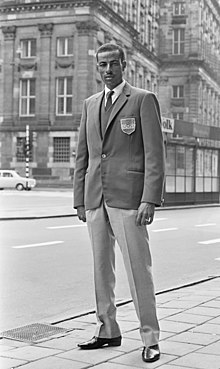
Back አበበ ቢቂላ AM Abebe Bikila AN آبيبي بيكيلا Arabic آبيبى بيكيلا ARZ Abebe Bikila AST Abebe Bikila AZ Абебе Бикила Bulgarian Abebe Bikila Catalan Abebe Bikila Czech Abebe Bikila Danish
 Bikila in 1968 | |||||||||||||||
| Personal information | |||||||||||||||
|---|---|---|---|---|---|---|---|---|---|---|---|---|---|---|---|
| Native name | Abebe Bikila | ||||||||||||||
| Born | August 7, 1932 Jato, Shewa, Ethiopian Empire | ||||||||||||||
| Died | October 25, 1973 (aged 41) Addis Ababa, Ethiopia | ||||||||||||||
| Resting place | Saint Joseph Church, Addis Ababa 8°58′9.7″N 38°45′53.6″E / 8.969361°N 38.764889°E | ||||||||||||||
| Height | 177 cm (5 ft 10 in)[1] | ||||||||||||||
| Weight | 57 kg (126 lb)[1] | ||||||||||||||
| Sport | |||||||||||||||
| Sport | Long-distance running | ||||||||||||||
| Event(s) | Marathon, 10,000 m | ||||||||||||||
| Achievements and titles | |||||||||||||||
| Personal bests |
| ||||||||||||||
Medal record
| |||||||||||||||
Shambel Abebe Bikila (Amharic: ሻምበል አበበ ቢቂላ; August 7, 1932 – October 25, 1973) was an Ethiopian marathon runner who was a back-to-back Olympic marathon champion. He was the first Ethiopian Olympic gold medalist, winning his first gold medal at the 1960 Summer Olympics in Rome while running barefoot.[3] At the 1964 Tokyo Olympics, he won his second gold medal, making him the first athlete to successfully defend an Olympic marathon title. In both victories, he ran in world record time.
Born in Shewa, Abebe moved to Addis Ababa around 1952 and joined the 5th Infantry Regiment of the Ethiopian Imperial Guard, an elite infantry division that safeguarded the emperor of Ethiopia. Abebe served in the Kagnew Battalion during the Korean War.[4]
Enlisting as a soldier before his athletic career, he rose to the rank of shambel (captain). Abebe participated in a total of sixteen marathons. He placed second on his first marathon in Addis Ababa, won twelve other races, and finished fifth in the 1963 Boston Marathon. In July 1967, he sustained the first of several sports-related leg injuries that prevented him from finishing his last two marathons. Abebe was a pioneer in long-distance running. Mamo Wolde, Juma Ikangaa, Tegla Loroupe, Paul Tergat, and Haile Gebrselassie—all recipients of the New York Road Runners' Abebe Bikila Award—are a few of the athletes who have followed in his footsteps to establish East Africa as a force in long-distance running.[5][6][7]
On March 22, 1969, Abebe was paralysed due to a car accident. He regained some upper-body mobility, but he never walked again. While he was receiving medical treatment in England, Abebe competed in archery and table tennis at the 1970 Stoke Mandeville Games in London. Those games were an early predecessor of the Paralympic Games. He competed in both sports at a 1971 competition for disabled people in Norway and won its cross-country sleigh-riding event. Abebe died at age 41 in 1973 of a cerebral haemorrhage related to his accident four years earlier. He received a state funeral, and Emperor Haile Selassie declared a national day of mourning. Many schools, venues, and events, including Abebe Bikila Stadium in Addis Ababa, are named after him. He is the subject of biographies and films documenting his athletic career, and he is often featured in publications about the marathon and the Olympics.
- ^ a b Evans, Hilary; Gjerde, Arild; Heijmans, Jeroen; Mallon, Bill; et al. "Abebe Bikila". Olympics at Sports-Reference.com. Sports Reference LLC. Archived from the original on April 17, 2020.
- ^ "Abebe Bikila". trackfield.brinkster.net. Retrieved October 10, 2019.
- ^ "Remembering Bikila's 1960 Olympic marathon victory on its 60th anniversary". World Athletics. Retrieved August 8, 2021.
- ^ '6·25 전쟁' 참전 에디오피아 마라토너, 한국 두 번 살려준 사연
- ^ Cite error: The named reference
BenyoHenderson3was invoked but never defined (see the help page). - ^ Pitsiladis, Wang & Wolfarth (2011), p. 186
- ^ Cite error: The named reference
Gebreselassiewas invoked but never defined (see the help page).